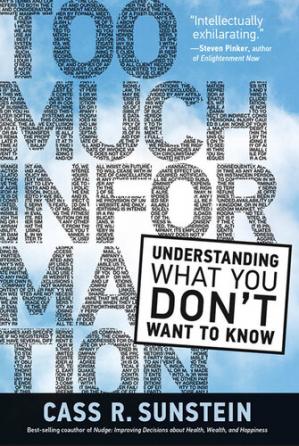Too Much InformationUnderstanding What You Dont Want to Know
|

|
 Diese Seite wurde seit 2 Jahren inhaltlich nicht mehr aktualisiert.
Unter Umständen ist sie nicht mehr aktuell.
Diese Seite wurde seit 2 Jahren inhaltlich nicht mehr aktualisiert.
Unter Umständen ist sie nicht mehr aktuell.
 Zusammenfassungen
Zusammenfassungen
 How much information is too much? Do we need to know how many calories are in the giant vat of popcorn that we bought on our way into the movie theater? Do we want to know if we are genetically predisposed to a certain disease? Can we do anything useful with next week's weather forecast for Paris if we are not in Paris? In Too Much Information, Cass Sunstein examines the effects of information on our lives. Policymakers emphasize “the right to know,” but Sunstein takes a different perspective, arguing that the focus should be on human well-being and what information contributes to it. Government should require companies, employers, hospitals, and others to disclose information not because of a general “right to know” but when the information in question would significantly improve people's lives.
How much information is too much? Do we need to know how many calories are in the giant vat of popcorn that we bought on our way into the movie theater? Do we want to know if we are genetically predisposed to a certain disease? Can we do anything useful with next week's weather forecast for Paris if we are not in Paris? In Too Much Information, Cass Sunstein examines the effects of information on our lives. Policymakers emphasize “the right to know,” but Sunstein takes a different perspective, arguing that the focus should be on human well-being and what information contributes to it. Government should require companies, employers, hospitals, and others to disclose information not because of a general “right to know” but when the information in question would significantly improve people's lives.
Sunstein argues that the information on warnings and mandatory labels is often confusing or irrelevant, yielding no benefit. He finds that people avoid information if they think it will make them sad (and seek information they think will make them happy). Our information avoidance and information seeking is notably heterogeneous—some of us do want to know the popcorn calorie count, others do not. Of course, says Sunstein, we are better off with stop signs, warnings on prescription drugs, and reminders about payment due dates. But sometimes less is more. What we need is more clarity about what information is actually doing or achieving.
 Dieses Buch erwähnt ...
Dieses Buch erwähnt ...
 Personen KB IB clear | Daniel Kahneman , Cass R. Sunstein , Richard H. Thaler , Amos Tversky | ||||||||||||||||||||||||||||||||||||
 Fragen KB IB clear | Wie treffen wir Entscheidungen?How do we decide? | ||||||||||||||||||||||||||||||||||||
 Begriffe KB IB clear |  Choice Architecture
, Choice Architecture
,  Phishing Phishing
| ||||||||||||||||||||||||||||||||||||
 Bücher |
| ||||||||||||||||||||||||||||||||||||
 Texte |
|
 Zitationsgraph
Zitationsgraph
 Zitationsgraph (Beta-Test mit vis.js)
Zitationsgraph (Beta-Test mit vis.js)
 Volltext dieses Dokuments
Volltext dieses Dokuments
 Anderswo suchen
Anderswo suchen 
 Beat und dieses Buch
Beat und dieses Buch
Beat hat dieses Buch während seiner Zeit am Institut für Medien und Schule (IMS) ins Biblionetz aufgenommen. Beat besitzt kein physisches, aber ein digitales Exemplar. (das er aber aus Urheberrechtsgründen nicht einfach weitergeben darf). Aufgrund der wenigen Einträge im Biblionetz scheint er es nicht wirklich gelesen zu haben. Es gibt bisher auch nur wenige Objekte im Biblionetz, die dieses Werk zitieren.












 Biblionetz-History
Biblionetz-History